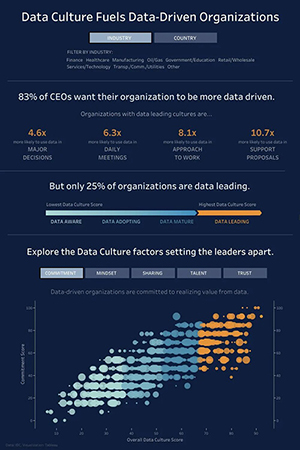Source: tableau.com
As businesses adopt data and analytics technologies to become more data-driven, they run into challenges — not for a lack of data or necessary tools but for a lack of data-driven behaviors and beliefs that surround data usage. To truly transform and leverage data and analytics technology investments, organizations need to focus on their people and build a culture that prioritizes data in decision making — also known as Data Culture.
IDC conducted a global survey of 1,100 respondents who use data within their organizations. They comprised a mix of executive and managerial positions and were people with technical and non-technical roles. Survey participants were from organizations with 500+ employees and were located in ten countries: Brazil, Canada, China, France, Germany, India, Japan, Mexico, United Kingdom, and the United States. Respondents represented several industries including financial services, manufacturing, healthcare, professional services/technology, utilities, retail/wholesale, and government/education.
IDC asked survey participants questions that would help identify key explicit and implicit characteristics that influence how data is used in decision making. The survey collected attitudinal and behavioral measures of these characteristics. The analysis of the data helped build a scale to measure the presence and depth of key drivers and an overall measure of Data Culture. IDC first partnered with Tableau to assess the impact of Data Culture on business outcomes. In this piece, we explore trends at the regional and industry levels. Respondents were classified into one of four groups based on the maturity of their Data Culture.
Source: tableau.com
Last Updated on July 12, 2024

